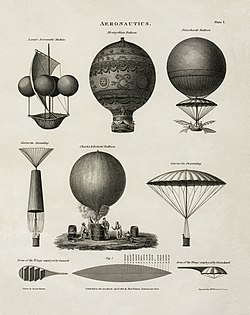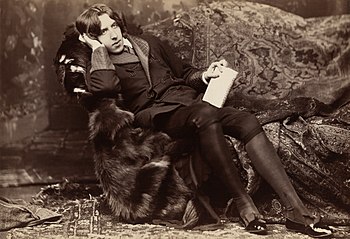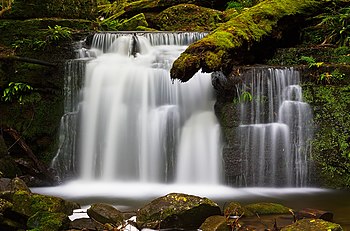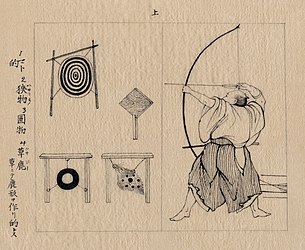Wikipedia:Picture of the day/October 2009
|
Featured picture tools: |
These featured pictures, as scheduled below, appeared as the picture of the day (POTD) on the English Wikipedia's Main Page in October 2009. Individual sections for each day on this page can be linked to with the day number as the anchor name (e.g. [[Wikipedia:Picture of the day/October 2009#1]] for October 1).
You can add an automatically updating POTD template to your user page using {{Pic of the day}} (version with blurb) or {{POTD}} (version without blurb). For instructions on how to make custom POTD layouts, see Wikipedia:Picture of the day.Purge server cache
October 1

|
Sprekelia formosissima, the most commonly known species of the Sprekelia genus of plants native to Central America, but widely cultivated around the world. Sprekelia are often called "Aztec lilies", although they are not true lilies. Photo credit: Noodle snacks
Recently featured:
|
October 2

|
The cover of Puck from April 6, 1901, which depicts Columbia (the national personification of the United States) preening herself with an Easter bonnet in the form of a warship which bears the words "World Power". The bonnet plume resembles smoke and bears the word "Expansion" in reference to territorial gains of the Spanish–American War. Following that war the concept of American Empire was first popularized, raising questions of whether the U.S. was acting in an imperialistic manner. Debate continues a century later about whether current U.S. foreign policy is more imperialistic or more of a hegemony. Artist: Samuel D. Erhart; Restoration: Lise Broer
Recently featured:
|
October 3

|
A general map, showing the geography of Germany, the seventh largest country in Europe and the second most populous. Located in Central Europe, Germany is second only to Russia in the number of borders it shares with other European countries (9). Map credit: Lencer and NordNordWest
Recently featured:
|
October 4

|
|
Ross Bridge with the Uniting Church in the background, the two major landmarks of the town of Ross, Tasmania, Australia. Located on the bank of the Macquarie River, the town is listed on the Register of the National Estate. Photo credit: Noodle snacks
Recently featured:
|
October 5

|
A Currier and Ives chromolithograph print of Brooklyn in 1879. Now a borough of New York City, Brooklyn was named after Breukelen in the Netherlands as part of New Netherland and existed as an independent city until 1898, when it consolidated with Manhattan, The Bronx, Queens, and Staten Island to form the modern New York City. Restoration: Lise Broer
Recently featured:
|
October 6

|
The Eastern Grey Kangaroo (Macropus giganteus), native to southern and eastern Australia, is the most commonly encountered kangaroo species, as it can be found in and around the major cities within its range. Although males can typically reach a height of 2 metres (6.6 ft) and weigh around 66 kilograms (146 lb), and the scientific name translates to "gigantic large-foot", the Red Kangaroo is actually larger. Photo credit: Fir0002
Recently featured:
|
October 7

|
An 1818 technical illustration of hot air balloon technology, showing early balloon designs. The history of ballooning spans many centuries, going back to the Three Kingdoms era (220–280 AD) of China. Although the first recorded manned balloon flight by the Montgolfier brothers of France did not happen until 1783, it has been speculated that the people of the Nazca culture of Peru may have used hot air balloons to design the famous Nazca Lines. Engraver: Ambrose William Warren; Restoration: Adam Cuerden
Recently featured:
|
October 8

|
NGC 1672 is a barred spiral galaxy located in the constellation Dorado. Its center contains a nucleus engulfed by a starburst region, while four asymmetrical filament-like spiral arms extend outward from the ends of this bar. The spiral arms also contain numerous star formation regions. Photo credit: Hubble Space Telescope
Recently featured:
|
October 9

|
|
Two black soldier flies (Hermetia illucens) in the act of mating. A common and widespread species of soldier fly, the larvae serve many beneficial uses to humans: as scavengers in compost heaps, in manure management, in forensic entomology, and as live pet food. Adults, however, have no functioning mouth parts and instead spend their lives in search of mates and reproducing. Photo credit: Muhammad Mahdi Karim
Recently featured:
|
October 10

|
A 1901 etching of Queen Wilhelmina of the Netherlands, based on an 1898 painting of her in her coronation robe. Having assumed the throne at the age of ten after the death of her father, King William III, Wilhemina ruled for fifty-eight years (1890–1948), longer than any other Dutch monarch. In 1948 she abdicated in favor of her daughter Juliana, thereafter making few public appearances until the country was devastated by the North Sea flood of 1953. Engraver: George J. Verbeck, after Thérèse van Duyl Schwarze
Recently featured:
|
October 11

|
James Gillray's 1807 caricature of the breakup of the Ministry of All the Talents, a national government formed by Lord Grenville upon his appointment as Prime Minister of the United Kingdom. With the country at war with France, Grenville aimed to form the strongest possible government and so included most leading politicians. However, they failed to bring a conclusion to the war and broke up over the issue of Catholic Emancipation.
Recently featured:
|
October 12

|
The California Ground Squirrel (Spermophilus beecheyi) is a common and easily observed ground squirrel of the western United States and the Baja California peninsula. Their upper parts are mottled, the fur containing a mixture of gray, light brown and dusky hairs. Head and body are about 30 cm (12 in) long and the tail an additional 15 cm (5.9 in). Photo credit: Howard Cheng |
October 13

|
Principal story plan for the White House, the official residence and principal workplace of the President of the United States, by Benjamin Henry Latrobe, 1807. Construction began with the laying of the cornerstone on October 13, 1792. Originally designed by James Hoban to be five times larger than the house that was eventually built, it was first occupied by John Adams. His successor Thomas Jefferson, in conjunction with Latrobe, expanded the White House to include the East and West Colonnades, which link the residence with the East and West Wings. Restoration: Lise Broer |
October 14

|
|
A panoramic view of the Camp Cove area of Watsons Bay, New South Wales, Australia, a harbourside, eastern suburb of Sydney. A mostly residential area with some recreational areas and beaches, Watsons Bay sits on the end of the South Head peninsula and takes its name from the sheltered bay and anchorage on its western side, in Port Jackson (Sydney Harbour). Photo credit: David Iliff |
October 15

|
A c. 1890–1900 photochrom of Dam Square, a town square in Amsterdam. Dam Square lies in the historical center of Amsterdam and is roughly rectangular in shape. It derives its name from its original function: a dam on the Amstel River, hence also the name of the city. The column with the statue on top (center-left) was known as "Naatje of the Dam" and was removed in 1914. Image: Detroit Publishing Co.; Restoration: Lise Broer |
October 16

|
Irish playwright, poet and author of numerous short stories and one novel, Oscar Wilde in 1882. Known for his biting wit, he became one of the most successful playwrights of the late Victorian era in London, and one of the greatest celebrities of his day. Several of his plays continue to be widely performed, especially The Importance of Being Earnest. Photo: Napoleon Sarony; Restoration: Lise Broer |
October 17

|
A male Lamprima aurata, one of about 1,200 species of stag beetles. The name is derived from the large and distinctive mandibles found on the males of most species, which resemble the antlers of stags (male deer). Males use their jaws to wrestle each other for favoured mating sites, but despite their often fearsome appearance they are normally not aggressive to humans. Photo credit: Fir0002
Recently featured:
|
October 18

|
The Peruvian Lily (Alstroemeria aurantiaca) is a long-lived perennial flowering plant in the Alstroemeria genus native to South America. Alstroemeria flowers are very popular for bouquets and flower arrangements in the commercial floristry trade. Despite the name, they are not true liles, although they do belong to the same order. Photo credit: Noodle snacks
Recently featured:
|
October 19

|
|
Orange fruits and a cross section of a third. The orange is a hybrid of ancient cultivated origin, possibly between pomelo and tangerine. Sometimes called the "sweet orange" to distinguish it from the bitter orange, the plant originated in Southeast Asia. The name is thought to ultimately derive from possibly the Telugu naarinja or Tamil nāram; both are names of the tree in the respective languages. Photo credit: Fir0002
Recently featured:
|
October 20

|
Gustave Doré's depiction of Canto VII of Dante's Inferno, the first part of the Divine Comedy. Here, we see the fourth circle (out of nine) of Hell, in which hoarders and wasters are forced to move around giant bags of gold, similar to the mythological story of Sisyphus. Allegorically, the Divine Comedy represents the journey of the soul towards God, with the Inferno describing the recognition and rejection of sin. Restoration: Adam Cuerden
Recently featured:
|
October 21

|
The Superb Fairywren (Malurus cyaneus) is a common and familiar passerine bird found across southeastern Australia. The species exhibits a high degree of sexual dimorphism; the male in breeding plumage has a striking bright blue forehead, ear coverts, mantle and tail with a black mask and black or dark blue throat. Non-breeding males, females (one shown here) and juveniles are predominantly grey-brown in colour. Photo credit: Fir0002
Recently featured:
|
October 22

|
An early 14th-century portolan chart showing the Mediterranean Sea from the Balearic Islands to the Levantine coast, as well as the western part of the Black Sea. These types of charts are rough navigational maps based on realistic descriptions of harbors and coasts provided by medieval European sailors. This particular specimen is the oldest original cartographic work in the United States Library of Congress. Map: Unknown; Restoration: Lise Broer
Recently featured:
|
October 23

|
A photo of Strickland Falls in Tasmania, Australia, taken using a neutral density filter. ND filters reduce light of all colors or wavelengths equally, allowing an increase in aperture and decrease in shutter speed without overexposing the image. To create the motion blur seen here, the shutter must be kept open for a relatively long time, making it necessary to reduce the amount of light coming through the lens. Photo credit: Noodle snacks
Recently featured:
|
October 24

|
An eighteenth century Ottoman example of Islamic calligraphy. The text reads "Ali is the vicegerent of Allah" in both directions, making it an example of mirror writing as well. This art, associated with Islam, has most often employed the Arabic script, throughout many languages including Arabic. Calligraphist: Mahmoud Ibrahim; Restoration: Lise Broer
Recently featured:
|
October 25

|
Ink-on-paper drawing of a Japanese archer practicing kyūdō, the Japanese art of archery. Archery in Japan has a long history, with the first molded metal images of Japanese bows dating to the Yayoi period. Bows were used in warfare until the arrival of Europeans in the 16th century. During the Edo period, Japan enjoyed a long era of peace, and archery, influenced by Chinese Zen monks, developed into a martial art. Artist: Unknown; Restoration: Lise Broer
Recently featured:
|
October 26

|
Two houseflies (Musca domestica) mating. One of the most widely distributed insects all over the world, females are ready to mate some 36 hours after emerging from the pupal stage. Normally the female mates only once, and will lay approximately 500 eggs in several batches of about 75 to 150 each. Photo credit: Muhammad Mahdi Karim
Recently featured:
|
October 27

|
|
De Magere Compagnie (completed 1637), which depicts a company of schutterij, a voluntary city guard or citizen militia in the medieval and early modern Netherlands. Frans Hals was commissioned to create this, but he was unable to complete it after three years, and the company hired Pieter Codde to finish it. Group portraits such as this of schutterij were known as schuttersstuk, and were popular among the guards themselves.
Recently featured:
|
October 28

|
A chromolithograph of the Statue of Liberty that was published about one year before the monument was officially dedicated on October 28, 1886. The statue, given to the United States by the people of France to represent the friendship between the two countries established during the American Revolution, is depicted with its original copper-bronze hue, but in this print, it faces southward with Manhattan and the Brooklyn Bridge visible in the background. In reality the statue faces east. Lithograph: Currier and Ives; Restoration: Lise Broer
Recently featured:
|
October 29

|
A Gaillardia 'Fanfare' cultivar. Native to North and South America, the common name "blanket flower" refers to the inflorescence's resemblance to brightly patterned blankets made by Native Americans. The genus consists of drought-tolerant annual and perennial plants. Photo credit: Noodle snacks
Recently featured:
|
October 30

|
|
A view of Jamison Valley in the Blue Mountains of New South Wales, Australia. It stretches for 12 kilometres (7.5 mi) in a north–south direction from just outside of Katoomba to Coxs River. The Jamison Valley is a popular place for hiking and camping. Photo credit: David Iliff
Recently featured:
|
October 31

|
A fanciful 1892 lithograph of the Salem witch trials. The trials, which took place between February 1692 and May 1693 in colonial Massachusetts, involved people accused of witchcraft, and have been used as a cautionary tale about the dangers of religious extremism, false accusations, lapses in due process, and governmental intrusion on individual liberties. Lithographer: Joseph E. Baker; Restoration: Lise Broer
Recently featured:
|
Picture of the day archives and future dates
